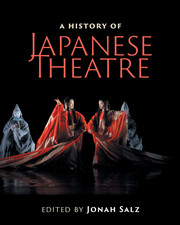Book contents
- Frontmatter
- Contents
- List of figures
- List of tables
- Contributors
- Contributors’ biographies
- Foreword
- Acknowledgments
- Note on Japanese terms
- List of abbreviations
- Timeline
- Editor's introduction
- I Traditional theatres
- Preface to Part I Japanese civilization arises
- 1 Ancient and early medieval performing arts
- Interlude Katari narrative traditions: from storytelling to theatre
- 2 Noh and Muromachi culture
- Interlude Noh and kyogen costumes and masks
- 3 Kyogen: classical comedy
- Interlude Iemoto : the family head system
- 4 Kabuki: superheroes and femmes fatales
- Interlude Nihonbuyo: classical dance
- Interlude Okinawan theatre: boundary of Japanese theatre
- 5 Bunraku: puppet theatre
- Interlude Misemono and rakugo : sideshows and storytelling
- Interlude Kamigata geinō : Kyoto-Osaka style
- Interlude Traditional theatre tomorrow: interview with Takemoto Mikio
- II Modern theatres
- Preface to Part II
- III Arcs and patterns
- IV Theatre architecture
- Preface to Part IV Evolution of Japanese theatre architecture
- V Theatre criticism
- VI Intercultural influences
- Epilogue: Frozen words and mythology
- Further reading
- Index
Interlude Traditional theatre tomorrow: interview with Takemoto Mikio
from Preface to Part I Japanese civilization arises
Published online by Cambridge University Press: 05 July 2016
- Frontmatter
- Contents
- List of figures
- List of tables
- Contributors
- Contributors’ biographies
- Foreword
- Acknowledgments
- Note on Japanese terms
- List of abbreviations
- Timeline
- Editor's introduction
- I Traditional theatres
- Preface to Part I Japanese civilization arises
- 1 Ancient and early medieval performing arts
- Interlude Katari narrative traditions: from storytelling to theatre
- 2 Noh and Muromachi culture
- Interlude Noh and kyogen costumes and masks
- 3 Kyogen: classical comedy
- Interlude Iemoto : the family head system
- 4 Kabuki: superheroes and femmes fatales
- Interlude Nihonbuyo: classical dance
- Interlude Okinawan theatre: boundary of Japanese theatre
- 5 Bunraku: puppet theatre
- Interlude Misemono and rakugo : sideshows and storytelling
- Interlude Kamigata geinō : Kyoto-Osaka style
- Interlude Traditional theatre tomorrow: interview with Takemoto Mikio
- II Modern theatres
- Preface to Part II
- III Arcs and patterns
- IV Theatre architecture
- Preface to Part IV Evolution of Japanese theatre architecture
- V Theatre criticism
- VI Intercultural influences
- Epilogue: Frozen words and mythology
- Further reading
- Index
Summary
Takemoto Mikio is Professor, Faculty of Letters, Arts and Sciences, Waseda University. He was Director of the Tsubouchi Memorial Theatre Museum (2004–13). Awardee of the Kanze Hisao Noh Award of Hōsei University, his publications include Edo jidai no nōgaku ni kansuru kisoteki kenkyū (Studies on noh during the Edo period, 1993), Kan'ami Zeami jidai no nōgaku (Noh in the times of Kan'ami and Zeami, 1999), and Muromachi chūkōki no nō no keisei katei ni kansuru kisoteki kenkyū (On the development of noh in the Muromachi period, 2002). This October 2012 interview surveyed Professor Takemoto's long experience as archivist, fan, and critic of traditional performance.
The particular position of Japanese theatre in the world can be summarized in two points:
1 that it has a rich tradition – noh has been performed continuously for over 600 years, and kabuki and bunraku for over 300 years;
2 that Japan was one of the first Asian nations to be strongly influenced by European theatre, intensifying after the Meiji Restoration (1868).
Japanese traditional drama has struggled until now to find ways to assimilate and co-exist with Western theatre, striking a balance between preservation and adaptation. On the other hand, Japan was fortunate to have been recognized early in the West for its theatrical traditions. At the same time as Japan was importing Western techniques and texts, the early introduction of noh to the West by Ernest Fenollosa through Ezra Pound's skilled translations began the fascination with noh in Europe. These texts were soon followed by translations of such fine works as The Tale of Genji, further revealing the high level of classical Japanese literature overseas. These dual unique aspects – simultaneously assimilating from, while promulgating to, the West – are not found in other Asian countries.
National policy inadequacies
Despite these felicitous beginnings for noh's interaction with modernity, in order for traditional performing arts in Japan today to build new audiences to sustain themselves, outreach to youth is vital. Encountering fine things at a young age is especially important. Yet in the Japanese school system, theatrical education consists of student performances of skits and pageants, but does not introduce pupils to fine-quality professional theatre.
- Type
- Chapter
- Information
- A History of Japanese Theatre , pp. 192 - 196Publisher: Cambridge University PressPrint publication year: 2016



